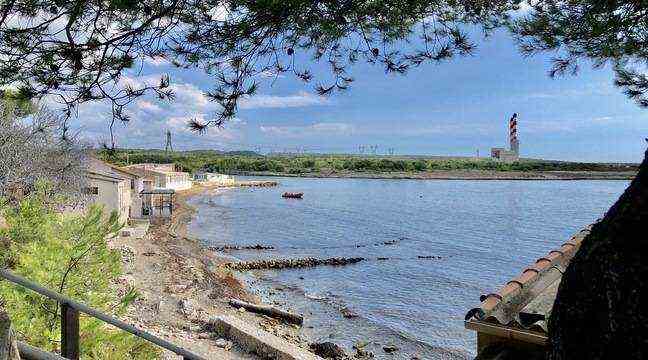At a time of overcrowded creeks and while a quota is being considered for the Sormiou cove, there are places on the Marseille coast that never see tourists, or almost. “No one comes here by chance,” knows Dora, who runs the only restaurant in the Ponteau area, in the town of Martigues, in the Bouches-du-Rhône. And for good reason, to access this small cove, you have to travel five kilometers on a road lined with pipelines and chimneys from the refineries of the imposing petrochemical complex located about ten kilometers west of Marseille. An uninviting landscape which nevertheless leads to a little corner of paradise.
The calanque de Lavera, its 41 cabins, its bar-restaurant, its handful of year-round residents and its few seasonal rentals. “Three-quarters of customers who do not know call us on the way and tell us: ‘I think we are lost,” “laughs Alexandre, Dora’s son, who manages a few rental properties.
From Guédiguian to Plus belle la vie
However, the place remains quite confidential and is communicated mainly by word of mouth. This one seems to work particularly well in the film industry. From Robert Guédiguian as a pioneer for To life, to death (1995) and Along the breadcrumb trail (2014) to Something is happening (2018) by Anne Alix through scenes from More beautiful life, documentaries, or advertisements, the bar-restaurant and cabins of this unsuspected cove attract for its paradox. There is here a striking contrast between these dwellings, former shelters of fishermen from another age, the modernity of the factories, the immutability of the rock, the sea and the immobility of the tankers who wait at sea. A setting which, depending on the setting, exposes this paradox or stages a picturesque and idyllic landscape.
Factories that “protect the world”
Patrick, a 60-year-old Martégal, has been coming here since he was little. That day, he comes out of the water after a game of spearfishing. “It’s heaven here,” he smiles. “Finally, you have to look at the sea,” he continues, not worried about the quality of the water because of the proximity of the industry. “The water is clean and very supervised”. Last year, an iron chloride leak from factories dissuaded him from coming there for many months.
For the rest, factories are rather popular here. “It protects people”, says our underwater hunter who makes “beautiful fish”. Angelo, lyric singer and one of Dora’s sons, agrees. “For us, the factories are the barrier. Otherwise, there would only be Germans and tourists, because it’s sand here ”.
Sand by the sea around Marseille, a rare commodity. These sheds almost quite simply disappeared. Nearly 40 have already been razed, without cadastral registration and encroaching on the public maritime domain. “The fishermen’s huts here go up the walls as you go, and in the end you have a house,” Patrick observed. Those who survived did so under the old legal concept of ” acquisitive prescription “. Or the fact of acquiring possession of an untitled property if one can justify an occupation of more than thirty years.
“The” shits “were sold between us for a handful of figs”
Since this long legal conflict was settled, since running water was brought in by the municipality in the mid-1990s, and since fiber is now installed, the hamlet has changed. “Today, the ‘shits’ which were sold between us for a handful of figs are sold at a high price. Especially for ten years, “regrets Dora. “Of the elders, there are not many left,” adds Mathieu, 74, in a conversation where only his blue eyes, his receding hairline and his lion’s head tattooed on the shoulder protrude from the fence.
He is nostalgic for an era, that before the demolition of half of the sheds and the sale of many others by heirs. “We don’t know each other anymore”.
“Here, people were only fishermen when they came to the Eternal”
In the 1970s and 1980s, the mood was quite different. “There are creeks like the one in Carry which were more for the bourgeoisie. But here, there was no station, you had to come by walking, Dora rewinds. When I arrived here, when my family bought out, the bar and restaurant was a hobby hotel, evidenced by all the tiny rooms upstairs. In the village lived an old prostitute, an old pimp. How to tell you, this calanque, it was a bit the corner where the small Marseillais thugs came to hide. Here, people were only fishermen when they came to the Eternal, ”she slips.
A sign that times are changing, her children, Angelo and Alexandre, do not intend to pursue the restaurant. The first wants to devote himself to his singing career, the second is doing well in business and intends to grow the place, which, once past the factories, offers an unparalleled setting on the Provencal coast.

